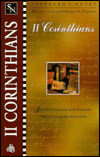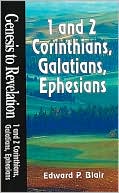2 Corinthians: Power in Weakness
In 2 Corinthians: Power in Weakness , we discover an early church struggling with problems such as disunity, rancor, moral failure—problems that continue to plague Christians today. Paul addresses these problems, but he also shares with us in 2 Corinthians a core, seemingly contradictory, message of the Christian faith: God's power is best felt in our weaknesses.\ A Guided Discovery of the Bible The Bible invites us to explore God’s word and reflect on how we might respond to it. To do this,...
Search in google:
2 Corinthians\ Power in Weakness \ \ By Kevin Perrotta \ Loyola Press\ Copyright © 2006 Kevin Perrotta\ All right reserved.\ ISBN: 9780829423266 \ \ \ How to Use This Guide\ You might compare the Bible to a national park. The park is so large that you could spend months, even years, getting to know it. But a brief visit, if carefully planned, can be enjoyable and worthwhile. In a few hours you can drive through the park and pull over at a handful of sites. At each stop you can get out of the car, take a short trail through the woods, listen to the wind blowing through the trees, get a feel for the place.\ In this book, we will read excerpts from Paul’s letter called 2 Corinthians. Because the excerpts are short, we will be able to take a leisurely walk through them, thinking carefully about what we are reading and what Paul’s words mean for our lives today.\ This guide provides everything you need to explore 2 Corinthians in six discussions—or to do a six-part exploration on your own. The introduction on page 6 will prepare you to get the most out of your reading. The weekly sections provide explanations that will help illuminate the meanings of the readings for your life. Equally important, each section supplies questions that will launch your group into fruitful discussion, helping you to both investigate Paul’s letter for yourself and learn from one another. If you’re using the book by yourself, the questions will spur your personal reflection.\ Each discussion is meant to be a guided discovery.\ Guided. None of us is equipped to read the Bible without help. We read the Bible for ourselves but not by ourselves. Scripture was written to be understood and applied in the community of faith. So each week you’ll find background and explanations in “A Guide to the Reading,” which draws on the work of both modern biblical scholars and Christian writers of the past. The guide will help you grasp the meanings of the readings. Think of it as a friendly park ranger who points out noteworthy details and explains what you’re looking at so you can appreciate things for yourself.\ Discovery. The purpose is for you to interact with 2 Corinthians. “Questions for Careful Reading” is a tool to help you dig into the text and examine it carefully. “Questions for Application” will help you consider what these words mean for your life here and now. Each week concludes with an “Approach to Prayer” section that helps you respond to God’s word. Supplementary “Living Tradition” and “Saints in the Making” sections offer the thoughts and experiences of Christians past and present. By showing what Paul’s words have meant to others, these sections will help you consider what they mean for you.\ How long are the discussion sessions? We’ve assumed you will have about an hour and a half when you get together. If you have less time, you’ll find that most of the elements can be shortened somewhat.\ Is homework necessary? You will get the most out of your discussions if you read the weekly material and prepare answers to the questions in advance of each meeting. If participants are not able to prepare, have someone read the “Guide to the Reading” sections aloud to the group at the points where they appear.\ What about leadership? If you happen to have a world-class biblical scholar in your group, by all means ask him or her to lead the discussions. In the absence of any professional Scripture scholars, or even accomplished amateur biblical scholars, you can still have a first-class Bible discussion. Choose two or three people to take turns as facilitators, and have everyone read “Suggestions for Bible Discussion Groups” (page 84) before beginning.\ Does everyone need a guide? a Bible? Everyone in the group will need his or her own copy of this book. It contains all the portions of 2 Corinthians discussed in the weekly sessions, so a Bible is not absolutely necessary—but each participant will find it useful to have one. You should have at least one Bible on hand for your discussions. (See page 88 for recommendations.)\ How do we get started? Before you begin, take a look at the suggestions for Bible discussion groups (page 84) or individuals (page 87).\ \ When I Am Weak, Then I Am Strong\ I must admit that our family dog is not very well trained. Sometimes he comes when called. Other times, he responds to cries of “Rupert, Rupert!” with a backward glance over his shoulder as he trots out of the yard and off to who knows where. So we are thinking of setting up an electronic fence. Unobtrusive transmitters will be placed along the property line, and Rupert will have to wear a special collar. Whenever he begins to step out of bounds, an electronic signal will activate a buzzer in the collar, reminding him where he belongs. The system will mark out a comfort zone for him—our yard—surrounded by a zone of discomfort.\ In a way, Rupert reminds me of myself. I have a comfort zone too—a range of circumstances and activities where life seems good and I’m confident that I can handle whatever comes at me. Beyond that range lie difficulties, stress, and pain. As I edge up to the limits of my comfort zone, I begin to feel twinges of anxiety. Probably the same is true for many other people.\ What happens if we cross the boundary and leave our comfort zone? Unpleasant sensations may get worse. There’s a world of harsh realities out there. Nevertheless, getting an education, earning a living, raising children, making a contribution to society—every path in life leads outward to challenges and hardships, stresses and distresses. Often we have to step outside the range where we feel comfortable. Only then are we able to grow and mature. Yet, while challenges and hardships help us grow, they also reveal our shortcomings and limitations.\ Even if we’re inclined to take refuge inside our comfort zone, things happen that wreck our comfort. We fall victim to an accident. We get sick. We grow old. Feelings of safety and control ebb. Our weaknesses are exposed.\ The apostle Paul was not a man to hole up inside his comfort zone. He spent a lifetime journeying outward from one hard situation to another. His goal was not to keep himself safe and secure but to make God’s love known to people—to spread the news of Jesus of Nazareth. Pursuing this goal brought Paul face-to-face with problems that perplexed him, even discouraged him. Sometimes he ran out of material resources. He was jailed, beaten, and thrown out of town. Day after day, he felt his weaknesses—and in the process he made an immensely important discovery: our weaknesses are precisely where we encounter the power of God.\ Paul mentioned his discovery in several of his letters. But he gave it special emphasis in the letter we are about to read—2 Corinthians. In this guide, we are going to read portions of the letter in an effort to understand Paul’s discovery of the interplay between divine power and human weakness—and attempt to learn how to cooperate with God’s power when we find ourselves far outside our comfort zone.\ Paul seems to have made his discovery about God’s power in human weakness in at least three stages.\ Early in his life, growing up as a Jew, Paul learned from the Old Testament Scriptures that God resists the proud and shows kindness to the humble (Psalm 18:27). In the Old Testament, God often displays his power when people are at the end of their rope and call on him for help.\ But the intersection of divine power and human weakness came into sharper focus in Paul’s mind when Jesus revealed himself to him (see Acts 9:1–19). At this moment, Paul recognized that Jesus is the Messiah and Lord of all. But how had the Messiah and Lord acted on behalf of human beings? It was by enduring crucifixion—one of the most agonizing experiences of human weakness imaginable. Jesus played his part in God’s purposes for humanity by submitting his human weakness to his Father, placing his fear and pain in God’s hands (Mark 14:36; Hebrews 5:7). Through Jesus’ obedient offering of his weakness and suffering to God, God reversed the effects of our disobedience to God: he broke sin’s hold on us and granted us forgiveness and reconciliation (Acts 10:39–43). By the ultimate weakness of dying, Jesus conquered death. By rising from the dead, he became the source of God’s life for us here and now, and the source of our ultimate resurrection into God’s kingdom (1 Corinthians 15:20–28). Looking at Jesus, Paul realized—undoubtedly with utter astonishment—that God’s power had become fully effective in human weakness.\ Even after this amazing revelation burst upon him, Paul needed to discover its personal meaning for him. Paul did not write an autobiography, and neither his letters nor Acts of the Apostles (which provides accounts of his missionary work) give us enough material to write a full-scale biography. We cannot trace the step-by-step development of his thinking. But in 2 Corinthians, we can see that the reality of God’s power in Paul’s weaknesses dawned on him gradually. Paul learned about God’s power in weakness as he tramped and sailed from city to city—far outside his comfort zone. He painfully experienced his own weaknesses and, at the same time, witnessed God’s power at work.\ In his letter, Paul shows us that he did not find it easy to take hold of the revelation of God’s power in human weakness through Christ. In this, he is like most of us. We are both attracted and dismayed at the idea that God works in human weakness. The assurance that God wishes to be powerfully present in our lives is certainly welcome news. But we would rather that he did not make our weaknesses the sphere where his power becomes effective. We naturally prefer prosperity to poverty, abundance to need, health and wholeness to sickness and disability. God would meet our preferences if he chose to work mainly through human strength and well-being—if he acted in our lives mainly by preserving us from our weaknesses and from the dangers that threaten us and by keeping us prosperous, successful, vigorous, and young. That is to say, we would like it if God would reverse the human condition, rather than working through it. By accepting death on a cross, however, Jesus fixed his presence at the dark center of human weakness and suffering. He demonstrated God’s commitment to act in and through our limitations, vulnerability to pain, and mortality. If we find this divine strategy hard to accept, we may be consoled by the evidence that Paul, too, found it a difficult truth.\ At the heart of Paul’s ability to live with the mystery of divine power in human weakness was his sense of a personal relationship with Jesus. Paul did not regard Jesus’ acceptance of his weakness and his offering of suffering to the Father merely as a model—an example “out there” for imitation. Paul did, certainly, regard Jesus as a model (for example, see Philippians 2:1–11). But he viewed Jesus as a unique model, who enables us to imitate him by drawing us into his life. Jesus invites us to be united with him, by faith, and to undergo death and resurrection in him (Romans 6:1–11). In this way, we can join our weaknesses and sufferings to his while sharing in his submission of weakness and suffering to the Father. God’s power at work in Jesus’ weakness and suffering then becomes active in ours. Paul knew himself to be “in Christ” and knew Christ to be in him. Only in this way did Paul find the power to go forward through difficulties with trust in God, regarding his weaknesses as opportunities for God’s power to be at work.\ Although Paul says a great deal in 2 Corinthians about power in weakness, that is not the focus of his letter. Mainly, he is dealing with problems that have arisen in his relationship with the Christians in Corinth. Consequently, we have a manifold challenge in reading his letter. First, in order to understand what he is saying, we need to get a basic understanding of the situation he faced in Corinth. Second, we need to sift his letter for what it says about our theme—God’s power in human weakness. Third, we need to consider what this message means for our own lives. Each week, the Guide to the Reading and Questions for Application will help you meet these challenges. Before we begin, it will be useful to take a brief look at the background to the situation in Corinth as Paul wrote.\ To be honest, at a distance of almost two thousand years, it is impossible to say for sure what was going on in Corinth when Paul wrote 2 Corinthians. Our knowledge—which comes largely from Paul’s two surviving letters to that community, 1 and 2 Corinthians—is sketchy. Here, however, is a plausible reconstruction of the situation.\ Paul was the first person to preach the gospel of Jesus Christ to people in the city of Corinth, in central Greece, around the year fifty (Acts 18:1–18). The church community he established there was probably quite small. Apparently the whole community could meet in a single house—the home of Gaius (Romans 16:23), who must have been a moderately wealthy man. Archaeologists estimate that the home of such a person in Corinth at the time might accommodate fifty visitors. Thus everyone in the church in Corinth would have known Paul personally. Keep this in mind as you read Paul’s letter and observe the stresses and strains in their relationship with him.\ After staying for “a considerable time” in Corinth (Acts 18:18), Paul moved to Ephesus, roughly a couple hundred miles east across the Aegean Sea, in present-day Turkey. From Ephesus, Paul sent the Corinthians some letters. The first (see 1 Corinthians 5:9) has been lost. The second was preserved; it is now called 1 Corinthians (around AD 53–54).\ Paul planned, after writing 1 Corinthians, to visit Macedonia, a region in northern Greece. He told the Corinthians he would travel to and from Macedonia via Corinth. As it turned out, he made only the first part of this double visit. Apparently, when he stopped in Corinth on his way to Macedonia, a painful incident occurred. Perhaps another Christian missionary, visiting Corinth at the time, criticized Paul before the church community, and the Corinthians seemed to agree with the criticism by failing to speak up in Paul’s defense. Distressed, Paul left Corinth and continued on to Macedonia. From there, he decided to skip the promised return visit to Corinth and went back to Ephesus directly.\ He then sent the Corinthians a sorrowful letter, no longer extant, calling them to reestablish their relationship with him (see 2:3–9—in this book, biblical citations refer to 2 Corinthians unless otherwise specified). Afterward, Paul received a report, perhaps from his assistant Timothy, that the Corinthian believers were open to a reconciliation; yet they felt hurt by his failure to carry through on his promise of a second visit. Paul’s cancellation of the visit even prompted some in the community to question Paul’s love for them. The Corinthians, we might think, were a bit supersensitive—a thought that may have crossed Paul’s mind also. In any case, he wrote another letter (2 Corinthians), to resolve the remaining problems. Judging from the first part of the letter, the tensions between Paul and the Corinthians seem to be on the way to resolution.\ A murky issue regarding the situation in the Corinthian church is the presence of outsiders who seem to be challenging Paul’s leadership. Apparently, when the Corinthians began to have doubts and suspicions about Paul’s authenticity and motives, some people who had come to Corinth from elsewhere tried to take advantage of these areas of vulnerability in Paul’s relationship with the Corinthians (see 2:5). Perhaps these outsiders were Christian missionaries who wanted the Corinthian Christians to repudiate Paul and accept them as their pastoral leaders. They seem to have criticized Paul’s preaching and presented themselves as superior to him. Some of Paul’s remarks suggest that these outsiders were promoting an understanding of Jesus that Paul finds inadequate (4:2; 11:4). But while scholars have expended a lot of effort trying to figure out who these shadowing figures were and how their preaching diverged from Paul’s, no conclusion has been reached.\ You may have noticed that I specified that the problems between Paul and the Corinthians seemed to be moving toward resolution in “the first part of the letter.” A puzzling feature of 2 Corinthians is that later in the letter, the problems seem to be worse than ever. Beginning in chapter 10, Paul suddenly changes his tone. He seems more upset than before. He feels backed into saying inflammatory things that he would rather not say. It seems that the hoped-for reconciliation with the Corinthians has fallen through (11:3–4). While in the first part of the letter there were hints that intruders in Corinth were causing problems, Paul left these intruders in the background (for example, 2:5). But now, in chapters 10 to 13, he speaks about them directly. The Corinthians seem to support and accept outsiders (11:20).\ How can this sudden shift be explained? Scholars speculate that before adding chapters 10 to 13 to the letter, Paul received disturbing news from Corinth. Or perhaps these are part of a subsequent letter by him that was later combined with the earlier one. In either case, the apparent deterioration in the Corinthians’ relationship with Paul demonstrates that Paul experienced not only the weakness of being persecuted by strangers who rejected the gospel but also the weakness of being misunderstood and rejected by believers who knew him well.\ Some modern readers think of Paul as a mighty teacher who occasionally hurled rhetorical thunderbolts down on his opponents. There is some truth to that impression, as we will see, especially in 2 Corinthians 10 to 13. But the letter as a whole shows us a very human apostle who experiences suffering in many forms, yet goes on with his mission for Jesus.\ \ \ Week 1\ Partners in Pain\ \ Questions to Begin\ 15 minutes\ Use a question or two to get warmed up for the reading.\ 1 What cheers you up when you’re down? Is there a remedy for sadness that works for other people but doesn’t work for you?\ 2 When was the last time you made a phone call or sent a letter or e-mail to give someone encouragement? Did it work?\ \ Opening the Bible\ 5 minutes\ Read the passage aloud. Let individuals take turns reading paragraphs.\ What’s Happening\ Paul writes to the Christians in Corinth to shore up his relationship with them. Rather than beginning with a discussion of problems that have arisen, he leads off with a prayer that reminds them of the common ground they share with him—their life together in Jesus Christ. Yet even in this prayer, Paul touches on a crucial area of misunderstanding between the Corinthians and himself. Some of them have begun to doubt his authenticity as an apostle because he often seems weak: he is battered by all kinds of hardships and persecutions. “Is all his suffering a sign that Paul is not truly spiritual?” they wonder. In his introductory prayer, Paul begins to show them a connection between suffering and genuine spirituality.\ Paul speaks about Jesus’ sufferings, his own sufferings, and those of the Corinthians. We know about Jesus’ sufferings from the Gospels. We don’t know what afflictions of his own Paul refers to here (perhaps he was more endangered than St. Luke lets on in Acts 19:21–41). We also don’t know what problems the Corinthians were experiencing. But for an idea of the hardships that Christians faced in this period, see Hebrews 10:32–34; 1 Peter 4:12–16.\ Paul has a cowriter of the letter, a member of his missionary team named Timothy (1:1). But when Paul writes “we,” he often means “I.” He sends his letter to Christians in Corinth and in “Achaia”—the province of which Corinth is the capital (1:1). He addresses them as “saints” (1:1), not to imply that they are already models of holiness but that that is what they should become.\ The Reading: 2 Corinthians 1:1–11\ God, the Source of Peace . . .\ 1:1 Paul, an apostle of Christ Jesus by the will of God, and Timothy our brother,\ To the church of God that is in Corinth, including all the saints throughout Achaia:\ 2 Grace to you and peace from God our Father and the Lord Jesus Christ.\ . . . the Source of Encouragement . . .\ 3 Blessed be the God and Father of our Lord Jesus Christ, the Father of mercies and the God of all consolation, 4 who consoles us in all our affliction, so that we may be able to console those who are in any affliction with the consolation with which we ourselves are consoled by God.\ 5 For just as the sufferings of Christ are abundant for us, so also our consolation is abundant through Christ. 6 If we are being afflicted, it is for your consolation and salvation; if we are being consoled, it is for your consolation, which you experience when you patiently endure the same sufferings that we are also suffering. 7 Our hope for you is unshaken; for we know that as you share in our sufferings, so also you share in our consolation.\ . . . the Source of Help\ 8 We do not want you to be unaware, brothers and sisters, of the affliction we experienced in Asia; for we were so utterly, unbearably crushed that we despaired of life itself. 9 Indeed, we felt that we had received the sentence of death so that we would rely not on ourselves but on God who raises the dead. 10 He who rescued us from so deadly a peril will continue to rescue us; on him we have set our hope that he will rescue us again, 11 as you also join in helping us by your prayers, so that many will give thanks on our behalf for the blessing granted us through the prayers of many.\ \ Questions for Careful Reading\ 10 minutes\ Choose questions according to your interest and time.\ 1 Paul refers to blessing in 1:3. We usually think of a blessing as a prayer that channels God’s approval and grace to someone or something—like the prayer in 1:2. Is that the kind of blessing that is going on in verses 3–4? Who is being blessed? What word might describe 1:3–4?\ 2 Count up the occurrences of “console” and “consolation” and of various words for suffering. What conclusion do you draw from your findings?\ 3 Reread verse 9. Do you think Paul did not trust God before the experience he mentions here?\ 4 Paul doesn’t give details of his recent suffering (1:8–10). What might account for this omission?\ \ A Guide to the Reading\ If participants have not read this section already, read it aloud. Otherwise go on to “Questions for Application.”\ 1:3–7. Paul speaks from recent experience (1:8–10) about God as the source of help in the midst of hardships and difficulties (1:3–4). Paul does not envision a distant God “away up” in heaven sending help to us “down here” on earth. At the center of Paul’s picture of God’s relationship with those who suffer is God’s Son, who did not remain in heaven but came to be with us as a human being. Jesus shared our weaknesses and problems. By voluntarily accepting the worst kind of human suffering—death by crucifixion—he freed us from the grip of the forces inside and outside us that would lead us into sin and away from God (Romans 5–8).\ In Paul’s understanding, Jesus suffered for us in two senses. In one sense, he suffered instead of us, so that we do not have to suffer. He brought us forgiveness, so that we do not have to suffer the separation from God that results from sin (Romans 5:6–11). In another sense, Jesus suffered for us by making his suffering a gift to us. He accepted the cross out of love for us; now he invites us to share in his love by sharing in his suffering. We share his suffering by accepting the hardships that come our way as we follow him (see Colossians 1:24). When we go through suffering in union with him, trusting in him and uniting our suffering to his, his love grows in us.\ We can see this happening in Paul. He has responded to God’s invitation to serve as an apostle. As he pursues his assignment, he has run into many difficulties. These, Paul realizes, are Jesus’ sufferings overflowing into his life (1:5).\ As he shares in Jesus’ sufferings, Paul experiences “consolation” from Jesus (1:6). The Greek words translated “consolation” and “console” here (1:3–7) do not refer to sympathy but to encouragement—giving courage, giving strength. In the Greek text of 1:6, Paul says literally that the consolation is “at work” in him. God gives him courage to handle his difficulties.\ The Corinthian Christians experience the same dynamic. Like Paul—in fact, through Paul’s preaching—they have become joined to Christ. So they experience “the same sufferings” (1:6), that is, the sufferings of Christ. In the New Revised Standard Version of the Bible (the translation that we are using in this guide), Paul says to the Corinthians, “as you share in our sufferings, so also you share in our consolation” (1:7). The word our has been added by the translators. More literally, in the Greek text, Paul says, “as you are sharers in the sufferings, so also in the consolation.” He means that as the Corinthians share in Jesus’ sufferings, they share in the consolation that God gives those who share the sufferings of his Son.\ Paul shows us that, for Christians, suffering is not an individualistic thing. He and the Corinthians are joined with Christ and, in Christ, with one another. So Paul’s sufferings for Christ in Ephesus somehow benefit the Christians in Corinth, and the consolation he receives from Christ somehow overflows to them. There is a mysterious sharing of both suffering and encouragement among the members of Christ’s body. It is as though we were stockholders in a corporation, sharing all the profits and losses.\ 1:8–11. Paul speaks about his recent suffering. In verse 9, he says, literally, “we had received the sentence of death.” Perhaps Paul means that he has contracted a fatal illness. Whatever the cause of his suffering, it was serious, and Paul staggered under the weight of it. “We despaired of life itself” (1:8), he says, meaning that he thought he was going to die. Notice that Paul does not put on a show of strength; he does not present himself as Mr. Tough Guy. Rather, he wants the Corinthians to know not only that he suffered but that he was weak in the face of the suffering. He tells them straight out that his sufferings drove him to the brink of despair. “I couldn’t cope with it,” Paul says. “It was more than I could handle” (see 1:8). Only if the Corinthians see his weakness can they grasp how he experienced God’s help—and learn how they can find God’s help in the midst of their own weaknesses and sufferings.\ “God allowed me to suffer in order to lead me to rely on him more deeply,” Paul tells the Corinthians (see 1:9). By coming face-to-face with death, he learned a lesson about God’s help. Paul left self-reliance on one side and despair on the other, and put his trust in God (1:8–9).\ Earlier Paul spoke of encouragement from God (1:3–7) but did not say exactly what the encouragement consisted of. In verses 9 and 10 he shows us the content of his encouragement: confidence that Christ, who has risen from the dead, will also raise us up into his eternal life. For Paul, this is the core of Christian consolation. Thus, when he spoke earlier about enduring patiently (see 1:6), he did not mean that the Corinthians should just keep their heads down and wait for the storms to pass. He meant that they should actively put their trust in God, believing that God will act for good in their suffering and by raising them from the dead, will ultimately vanquish evil and sorrow.\ Partnership in Christ creates a community of suffering, of encouragement, and of prayer. Paul thanks God on behalf of the Corinthians (1:3–7), and he asks them, in turn, to pray for him (1:10–11).\ Reflections. Jesus suffered the full effects of the world’s opposition to God’s will. He let this opposition crush him; he accepted death on a cross. Yet, by being crushed, he crushed the power of opposition to God—Satan, sin, and death. If we are willing to share in his suffering, our suffering will play a part in his kingdom coming in the world and touching the people around us (see Colossians 1:24–29).\ It may be easier to see God’s kingdom advancing in the world through Paul’s suffering than through ours. Constantly making missionary journeys and enduring persecution, Paul labors and suffers in his apostolic efforts to bring the good news about Jesus to people. Very few of us have Paul’s focused sense of Christian mission. Our hardships and pains tend to be more ordinary, less “apostolic” than Paul’s. Rather than being arrested and beaten for preaching the gospel, we lose a job or a loved one, or suffer rejection by a spouse or child, or develop a debilitating disease. Can these sufferings be a sharing in Jesus’ suffering? They can, because Jesus has united us with himself. Because we are united with him by faith and baptism, we are members of his body. Thus he shares the sufferings we encounter, and our sufferings become ways of sharing in his sufferings—and opportunities to experience his encouragement.\ Often, when things go wrong, we do not feel close to the Lord. But notice that Paul does not say that in his recent troubles he felt a powerful sense of connection with Jesus. Actually, he says that he felt “utterly, unbearably crushed” (1:8). It does not sound as if he had a sense of close attachment to Jesus then—or, if he did, it does not seem to have given him serenity. For Paul, as for us, suffering is suffering. Sometimes what is most painful for us is the apparent absence of the kind God who previously showered us with blessings. In some cases—the sickness of infants, for example—we may simply be incapable of imagining how God might ever use such suffering for good. But again, Paul does not suggest that we can always grasp how our sufferings are a sharing in Christ’s or how they will serve the coming of his kingdom.\ It may be worth reflecting that, if our union with Jesus’ sufferings is unseen and deeply mysterious, that does not make it different in principle from every other aspect of our relationship with him. In the Christian life, we always proceed on the basis of faith. We always face the challenge of trusting God in regard to things we cannot see—or can see only partially and fleetingly (1?Corinthians?13:12). Paul offers his own experience as an example of growing in trust in the “God who raises the dead” (1:9). This trust is a form of hope—and hope is a strange plant. Sown in the daytime, when the sunshine of God’s love seems to fill the world with his presence, hope matures and bears fruit in the dark night, when God may seem to have abandoned us in our weakness and pain.\ \ Questions for Application\ 40 minutes\ Choose questions according to your interest and time.\ 1 Paul twice calls Jesus “Lord” (1:2–3). What does it mean for you personally to call Jesus “Lord”?\ 2 How have you experienced consolation and encouragement from God? What difference has it made in your life? Where do you feel the need for it now? Where is God challenging you to learn (more deeply) the lesson Paul learned in 1:9?\ 3 Paul regards his sufferings as a share in the sufferings of Christ, to be endured with patience and hope in the resurrection (1:9). Yet he hopes that God will rescue him from suffering and imminent death (1:10). How do these two attitudes go together?\ 4 In his own distress, Paul was a channel of God’s encouragement to the Corinthians. When have your own difficulties and hardships put you in a position to comfort and help another person? Where might God be calling you to do this today?\ 5 When has someone’s willingness to suffer for Christ and for others been a source of encouragement for you? How could you follow their example?\ 6 For personal reflection: Paul was willing to talk about his weakness in the face of difficulties. Are you? Are there weaknesses that you would rather not think about or deal with? Is there help, guidance, or support available that you are not taking advantage of? Discuss your reflections with God.\ 7 Describe an experience when you have been part of a group—a department at work, a military unit, a sports team, whatever—where everybody helped each other in the hard places and there was a lot of encouragement. How could you help to bring this spirit to your family, work environment, or parish?\ 8 Is it always possible to comfort another person? What else can we do when we are forced to watch another person suffer and cannot alleviate their pain? What has been your experience in giving comfort? in receiving comfort? What “works”? What doesn’t?\ \ Approach to Prayer\ 15 minutes\ Use this approach—or create your own!\ ♦ Paul’s statement “on him we have set our hope that he will rescue us again” (1:10) may be an echo of Psalm 22:4–5: “In you our ancestors trusted; . . . in you they trusted, and were not put to shame.” Jesus began to pray this psalm on the cross (see Mark 15:34). One way to pray this psalm is as a reminder of Jesus’ suffering on our behalf. Since the psalm moves from urgent appeal (Psalm 22:1–21) to celebration of God’s faithfulness (Psalm 22:22–31), it also reminds us of Jesus’ confidence in God. Take a minute to reflect on Jesus’ sufferings, on those of someone you know, and on any difficulties you yourself are experiencing. Then, united with Christ, pray Psalm 22 together on behalf of all who suffer.\ \ Saints in the Making\ Better Able to Comfort\ This section is a supplement for individual reading.\ In her twenties, Jean Haines worked with children as a physical therapist. Her training enabled her to help children with serious disabilities learn to deal with their limitations. Sometimes they asked hard questions. “Why was I born this way?” “Why did God let this happen to me?” It was not easy to comfort a child with a lifetime disability, Jean says. “I could say, ‘Yes, I know you must be frustrated.’ But the child would think, ‘She doesn’t really know. She can run around the block.’”\ When she was thirty, Jean developed signs of multiple sclerosis. For a while she continued her work as a physical therapist. As MS reduced her mobility, she took a less-strenuous job, testing children for brain damage. After a few years, she retired.\ While MS prevented Jean from helping children as she had done before, she found that it opened a door that earlier had been closed. “It’s easier to say, ‘I know what it’s like,’ to a disabled person when they know that you have really experienced the kind of pain that they are going through,” she says.\ Jean’s message is more than one of sympathy. She works with an association called Victorious Missionaries, which is run by people with disabilities who want to help others with disabilities recognize their potential. “We want disabled people to understand that they have gifts too and to use them for the greater good,” Jean says.\ Six times a year, the branch of Victorious Missionaries in which Jean is involved, in Flushing, Michigan, hosts a daylong retreat for people with any sort of physical or mental disability. Through Scripture passages appropriate to the liturgical season, the retreats help participants see the light of Christ, Jean explains, and “encourage and empower them to bring the light of Christ to other people.”\ The members of the Victorious Missionaries tell the participants how their own disabilities have not prevented them from becoming better people, from praying and helping others. Having MS gives her credibility, Jean says. “Because of my disability, people ask themselves, ‘What does she have, that she is happy?’ ‘Who is this God that she loves so much?’ ‘There must be something to her message.’”\ \ \ \ Continues... \ \ \ \ Excerpted from 2 Corinthians by Kevin Perrotta Copyright © 2006 by Kevin Perrotta. Excerpted by permission.\ All rights reserved. No part of this excerpt may be reproduced or reprinted without permission in writing from the publisher.\ Excerpts are provided by Dial-A-Book Inc. solely for the personal use of visitors to this web site. \ \
Contents\ 4 How to Use This Guide\ 6 When I Am Weak, Then I Am Strong\ 12 Week 1\ Partners in Pain\ 2 Corinthians 1:1–11\ 24 Week 2\ The Power and the Glory\ 2 Corinthians 2:14–4:6\ 36 Week 3\ Looking at What Can’t Be Seen\ 2 Corinthians 4:7–5:10\ 48 Week 4\ Humility: A Kind of Weakness?\ 2 Corinthians 10\ 60 Week 5\ The Weakness of Being Misunderstood\ 2 Corinthians 11:1–21\ 72 Week 6\ Christ’s Grace Is Enough\ 2 Corinthians 11:21–12:10\ 84 Suggestions for Bible Discussion Groups\ 87 Suggestions for Individuals\ 88 Resources\







